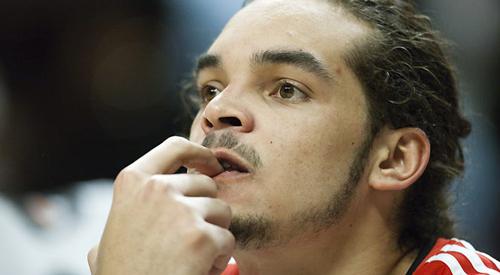
Slip-ups, slurs and the state of sexuality in the NBA
There have been a lot of words about words this spring, especially in NBA circles. Words uttered in anger, words yelled in frustration, words said like a joke. Words that hurt, words that annoy and words that result in a fine and a public tongue-lashing. But mostly, words seem to inspire more words.
The words are fodder for easy columns, a chance for a writer to apologize on behalf of the player, the team, the culture. They use it as a chance to set themselves higher than the player: they said a bad word, a hurtful word and a word I’d never utter, not even if nobody was around. These words come out by the hundreds, days after the original word.
These words – the ones here, on this page – are not about the word, really, they’re about the words after the word. Those are the words that give the word power.
It’s funny how times have changed.
It wasn’t all that long ago when Michael Jordan called Kwame Brown a flaming faggot. According to a report, Jordan unleashed such verbal fury he reduced a grown man to tears during a team practice. I don’t believe Jordan was ever fined for those words.
But when Kobe Bryant says that word to a referee – and, it should be noted, hurt the man a lot less – it was worth a $50,000 fine and a public lashing from the media.
Bloggers, beat reporters and columnists weighed in on the word, basically piling on in a dogpile of righteousness.
It’s a bad word, he’s bad for saying it, now let’s talk about the starting lineup.
[php snippet=1]
There’s something of a block here, like there’s an elephant in the room. The issue is mentioned, briefly addressed and everybody moves on. I get why: it’s an uncomfortable word for sportswriters to deal with, with repercussions that one doesn’t usually encounter on the sports beat. That’s fair, but the entire point of the word is make somebody uncomfortable.
I have friends who hate the word. Not dislike, not upset, but hate the word and what it means to them. It’s confining, it’s dismissive and it’s a way to say you’re not like me. You are different, less of a person than I am. While it also means lesser things, too, what matters is impact, not intent. Joakim Noah said it recently to shut up a fan and Bryant said it to essentially call a ref stupid, but both resonate a certain way because of the word.
This is not to take away from what Bryant or Noah said; it was regrettable, it was crass and it was – regardless of what they may now say – intended to hurt. One doesn’t call somebody a name in anger just for the fun of it. And it was said all the same, in different circumstances.
That context plays a role too. Just look at the difference in fines levied to Bryant and Noah. Everybody is mentioning that Noah spoke in anger, but he was responding to a drunken and insulting fan; it wasn’t an act of temper, like Bryant calling a referee a name after a bad call. There’s a difference between being insulted and being annoyed and it’s been reflected in the fines.
There’s something else at play here, a subtext of insecurity to the comments. Think back a few years to when Tim Hardaway said he wouldn’t play with a gay player. Or look at the columns written about Christine Daniels, especially the one which reveled in calling her a man in a dress.
But the reaction means attitudes are changing. Only a few days before Noah let slip a slur, Suns executive Rick Welts came out and after the NBA released a PSA about using homophobic language. Not long after, Steve Nash would say that he thinks an openly gay player would be accepted.
Things may be changing at a glacial pace – no athlete has come out yet – but at least they’re changing. It’s better than staying put certainly, but the only way it’s going to make a huge leap is when an athlete decides to, not when a scribe addresses it.
[php snippet=1]

